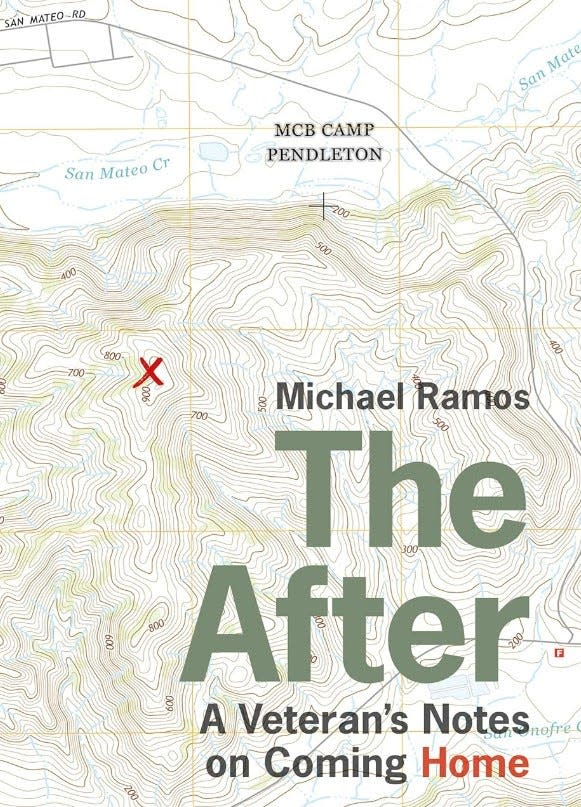Now a UNCW teacher, a Navy vet captures life coming home from Iraq War

It's been a century since Ernest Hemingway's character Nick Adams headed off solo into the North Woods to ease his PTSD from World War I.
And, according to Michael Ramos, civilians still don't get it. He writes about his own homecoming in "The After," a new volume from the University of North Carolina Press.
Ramos served nearly 10 years in the U.S. Navy as a Religious Program Specialist (RP), what used to be called a chaplain's assistant. Most of that time, he was detached to the Marine Corps; the Marines get their chaplains and Corpsmen (medics) from the Navy.
That might seem a wimpy, rear-echelon posting, compared with, say, a Navy SEAL or an Army Ranger, but in Iraq, where Ramos spent tours, it was near the front. Chaplains aren't allowed to carry weapons, so Ramos served as his chaplain's armed bodyguard. He dodged bullets and fired back.
He now teaches in the creative writing department at the University of North Carolina Wilmington, where he's assistant director of its Publications Laboratory and art director for its journal Ecotone.
"The After" is divided -- a bit messily, with flashbacks and flash-forwards -- between Ramos' time in service and his return home.
Compared with the Vietnam era, things are easier. Few civilians are spitting on veterans and calling them baby-killers. (Ramos does have an encounter with some Vietnam-era aged hippies, whose convictions are as rock-solid as a hard-shelled Baptist's.)
Yet, while Ramos and his buddies have to hear thanks for their service, over and over, they have to swallow a lot of stupidity. Like the person who asked, "What was it like to kill somebody?" or "You don't look disabled."
Ramos won't denounce the military and its performance, post 9/11, but he can't swallow the Lee Greenwood, Stars-and-Stripes, "kill them Ay-rabs" outlook either.
Like the veterans of World War II and Korea, Ramos' generation of veterans won't talk much about the war, except with each other. As one lance corporal put it in a well-intended therapy session, he doesn't want to share those memories, those horrors or demons, with family or friends.
Ramos heard a bunch of those stories, though, as an RP -- especially in the middle of the night when another Marine was remembering combat and dead bodies, couldn't sleep and had to talk to someone about it.
Asked by a young student if "American Sniper" was accurate, Ramos offers a generalized critique of all war movies: They don't catch the smells of blood, feces and burnt flesh. They don't catch the gallows humor of the grunts, peppered with dead-baby jokes. And they can't catch the camaraderie.
Marines and sailors didn't serve for God or America, Ramos writes; they fought for the guy on their left and the guy on their right, and their sergeants and the guys in adjoining units -- trying to save them from dying.
(This, by the way, echoes the findings of S.L.A. Marshall, the military historian and World War I veteran, who argued in "Men Against Fire" that frontline infantry loyalties were not to any ideology but to the comrades in their unit.)
Ramos often refers to fellow servicemen as his brothers. (Or sisters; he wound up marrying a veteran who also suffers from bad memories.)
The book concludes, more or less, as Ramos' teenaged son completes Marine boot camp.
"The After" is written in short, sharp bursts of text, with some essays just a couple of pages long. At the same time, trying to follow the tangled logic of a stressed, lost veteran, he will dash off sentences that are more than a page long.
Borrowing a leaf from Tim O'Brien's "The Things They Carried," he traces a Marine's life through its series of boxes: from the box in which recruits ship their civilian clothes home to the "box" that brings home the corpses. Another chapter or two follows his combat boots.
"The After" won't heal the rift between America and the tiny minority who actually fight its wars. But it goes a fair way toward explaining the vet's point of view.
Book review
The After: A Veteran's Notes on Coming Home
By Michael Ramos
Chapel Hill: University of North Carolina Press, $20 paperback
This article originally appeared on Wilmington StarNews: 'The After' from Michael Ramos describes his homecoming from war
